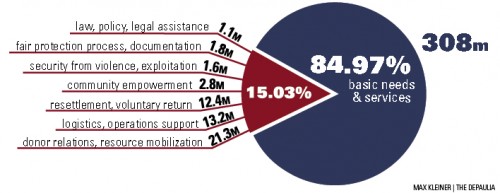 Imagine stepping out of your house and seeing everyone you know. They say hello to you as you pass, and your nose is overtaken by the smell of coffee, tea and jasmine. Old men selling wares in the streets call over the sounds of cars honking. To DePaul freshman Sarah Risheq, this is the vibe of Syria.
Imagine stepping out of your house and seeing everyone you know. They say hello to you as you pass, and your nose is overtaken by the smell of coffee, tea and jasmine. Old men selling wares in the streets call over the sounds of cars honking. To DePaul freshman Sarah Risheq, this is the vibe of Syria.
Risheq, an international student from Jordan, participated in one of DePaul’s events during the Syria Awareness Week, the week-long fundraiser for Syrian aid. All proceeds from the events were sent to the United Nations High Commissioner for Refugees (UNHCR) who maintains refugee camps in and outside of Syria for refugees and internally displaced persons (IDPs).
Unicef DePaul, DePaul’s Amnesty International Chapter, the DePaul Pre-Health Career Community (PCC), and DePaul’s Arabic Language and Culture Club hosted and sponsored the second annual fundraiser.
DePaul senior Shaza Loutfi, who was one of the primary organizers of the event, said they raised $750 last year and aimed to raise $1,000 this year.
Not including proceeds from an Insomnia Cookies fundraiser, the students broke their goal and raised more than $1,200.
Risheq, who performed at an event that featured art and performances relating to the Syrian conflict, came to DePaul to study Peace, Justice and Conflict studies, but she said she wants to be somewhere with refugees.
“People (in the U.S.) barely know (anything) about the Middle East,” Risheq said.
Her personal experiences in Syria triggered her to write poetry. She read her work out loud for the first time at the event, and her verses expressed homesickness, grief and hope.
“My poem is universal for people living in the Middle East,” Risheq said. “Incidents that happened with my family triggered me to show the reality of situations families go through. It’s not that I want pity. I want to provoke (people) so they want to look into it and ask questions.”
Risheq, would visit her family in Syria every summer until four years ago when “the incidents” began.
In March 2011, protests against the administration of the Syrian Arab Republic’s president, Bashar Al-Assad, led to a military crackdown that the UNHCR has condemned for a long list of human rights abuses.
According the UNHCR, there were 6.5 million Syrians in 2014 who were internally displaced, meaning they were forced to flee their homes, and over 3 million had become refugees in neighboring countries like Lebanon, Turkey, Iraq and Jordan.
The UNHCR’s estimated budget for Syrian aid efforts totaled $362.5 million this year. The greatest expenses are used to supply basic needs including health services, shelter and infrastructure, basic and domestic items, education and services for people with specific needs.
The DePaul students also wanted to spread awareness about the issue. One day they pitched a refugee tent in the student center and on another day challenged students to point to Syria on a map.
“A lot of (DePaul students) surprised us with how much they knew,” Loutfi said. “I was really proud of them for asking and wanting to know more.”
The final event hosted Zaher Sahloul from the Syrian American Medical Society (SAMS) to demonstrate how to provide medical help in a conflict area. All proceeds from that particular event, totalling $111, was donated to SAMS.
The other proceeds from the fundraiser will be sent in a check to the UNHCR with “Syria” written in the memo to ensure the money is used for Syrian aid.
Loutfi said they were in contact with the UNHCR office in the U.S. “They do know what we’re doing and are grateful.”
According to the UNHCR, the highest number of Syrian refugees, 1.5 million, have fled to Turkey, 1.1 million to Lebanon, more than 624,000 to Jordan, and more than 380,000 in Egypt and Iraq combined.
The 2015 UNHCR budget for relief to Jordan is $404.4 million, most of which is devoted to emergency response efforts for Syrian refugees.
“(The fact that there are) refugee camps make people think people are having their basic neds met, but they’re not,” Loutfi said. “(Donations) go to the tents, the food and the basic running of the camp itself.”
Students made cards for refugees in the camps, which Loutfi said would be hand-delivered by a student going to one of the camps this summer.
“Hope keeps people alive, and that’s a big thing,” Loutfi said.


Arafat / Mar 9, 2015 at 8:11 am
I’ve got a novel idea. Let’s do nothing. Let the Muslims deal with their own problems for a change. Let’s let countries like Saudi Arabia, Qatar, Kuwait with their endless ocean of money and Western-bought armaments figure it out instead. Surely they – being practitioners of the religion of compassion and peace – will step right up to the plate in our stead.
OK, you caught me there. You knew I was kidding! You knew what I know which is that there is no answer to these Islamic cesspools. Whatever we do will be discredited and if we do nothing then Syria will become just another country in the endless line of Hell on Earth Islamic countries.
We cannot save Muslims from themselves. It is like trying to save an alcoholic. Until they are ready to abandon their religion – a religion that emphasizes aggression and violence and sadism – anything we do will simply be a band-aid on a gaping wound.
Let them go through their DTs on their own. Only then will they be ready for our friendship and help, and only then will we find a way forward together as friends.